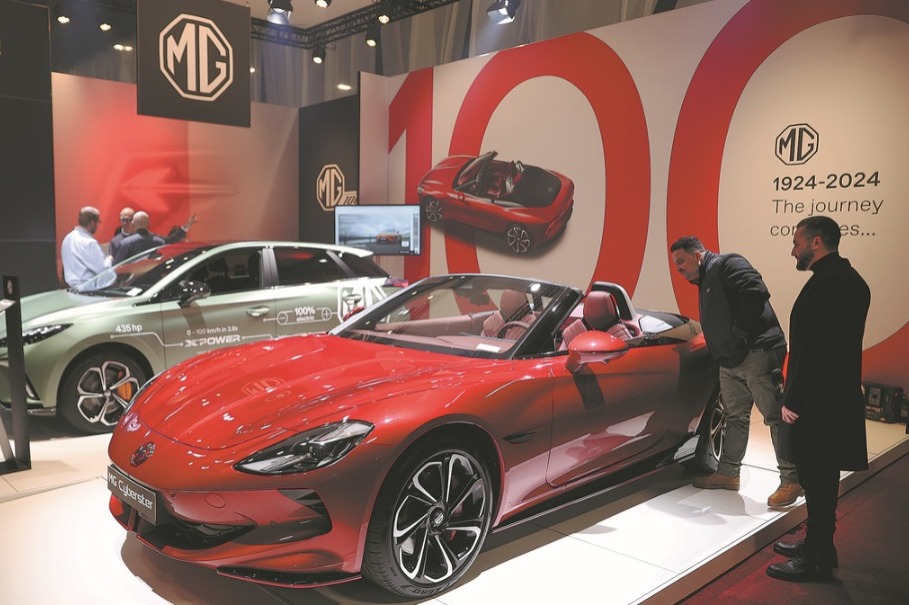China will take all necessary measures to firmly defend the legitimate rights of its companies, said the Ministry of Commerce on Thursday, in the wake of the European Union”s unfounded actions to slap hefty tariffs on Chinese-made electric cars.
Brussels’ protectionist actions are in utter disregard for the cooperation of Chinese firms extended during the probe, and discourage governments and industries of EU member states, besides straining ties between the bloc and the world’s second-largest economy, officials and executives said.
The European Commission has demanded a substantial amount of information regarding development plans, technological processes and product formulations of Chinese EV and battery companies, said He Yadong, a spokesman for the ministry, at a news conference.
The scope, scale and quantity of information requested by the EC are unprecedented and far exceed the requirements of an antisubsidy investigation, He said.
Despite that, consequent to Brussels’ decision to launch the probe, the Chinese government has engaged in extensive communications with the EU and its member states, including Germany and France, in multiple forms, like face-to-face meetings, official talks and written correspondences over 80 times, the ministry said.
Beijing has actively sought avenues for open communication and constructive engagement with Brussels, fully demonstrating its sincerity and willingness to seek win-win solutions, said Xu Hongcai, deputy director of the China Association of Policy Science’s Economic Policy Committee.
Though Chinese enterprises cooperated with the EU’s probe to the extent possible and provided information as required, Brussels still decided to impose punitive tariffs, He said.
From next month, the EU will impose additional tariffs on Chinese-made EVs, ranging from 17.4 percent for BYD to 38.1 percent for SAIC, on top of the standard 10 percent car duty, unless Beijing agrees to an effective solution to so-called subsidies that the EU claims are distorting its markets.
The EU’s move to impose hefty tariffs on Chinese EVs is a blatant protectionist measure and a politically motivated decision, said Jian Junbo, deputy director of the Center for China-Europe Relations at Fudan University’s Institute of International Studies.
The basis and procedures for this decision do not align with the World Trade Organization’s rules, and its consequences could prove detrimental to the stable and healthy development of China-EU relations, Jian said, adding that the EU’s protectionist measures run counter to the global trend of globalization and ultimately hinder the innovation and global competitiveness of European EV manufacturers.
The European automobile industry, however, has not submitted any applications to the European Commission requesting the investigations. On the contrary, European car manufacturers such as BMW, Mercedes-Benz and Volkswagen have expressed their opposition to Brussels’ actions.
Oliver Zipse, CEO of BMW, said in a statement that the adoption of protectionist measures like tariffs could trigger a cycle of retaliation, leading to a breakdown of cooperative trade relations.
On Monday, Beijing opened an antidumping investigation into pork imports from the EU and is also reviewing applications seeking an antisubsidy probe into the bloc’s dairy products.
In addition, an antidumping investigation launched in January into brandy imported from the EU is moving forward.
Governments of various EU member states also voiced their concerns that protectionist moves of the EC may cripple fair global competition.
“The European Commission’s punitive tariffs hit German companies and their top products,” German Transport Minister Volker Wissing said on the social media platform X. “Cars must become cheaper through more competition, open markets and significantly better business conditions in the EU, not through trade war and market isolation.”
Hungarian Minister for National Economy Marton Nagy condemned the move as overly protectionist in a statement. “We do not agree with the brutal European punitive tariffs on Chinese electric car manufacturers; excessive protectionism is not the solution.”
The commission’s decision would unfairly discriminate against Chinese manufacturers and disrupt market competition, which had been vital for the European Union, Nagy said.
In addition to the probe into Chinese electric cars, Brussels has resorted to a series of trade and investment restrictions on China since October last year. In all, 41 measures have been taken, with an estimated combined value of $28.4 billion, according to China’s Commerce Ministry.
These measures have been accompanied by intense investigations under the pretext of the Foreign Subsidy Regulation and International Procurement Instrument, severely affecting Chinese companies’ economic activities in Europe and undermining China-EU economic cooperation.
Contact the writers at wangkeju@chinadaily.com.cn

